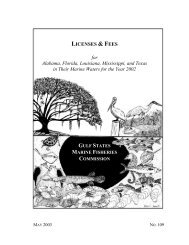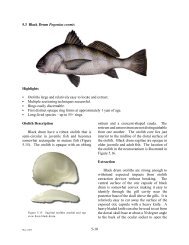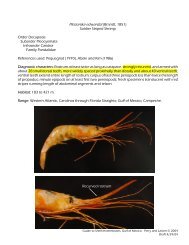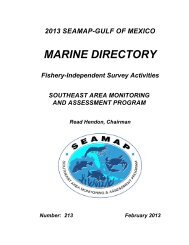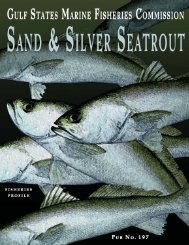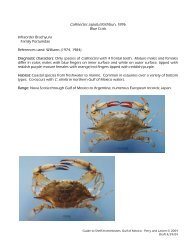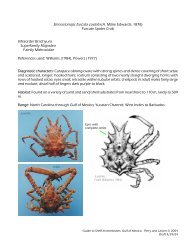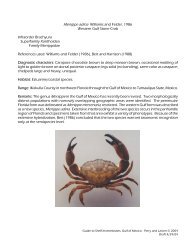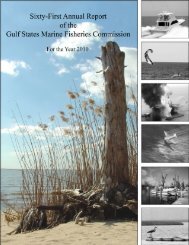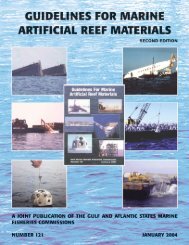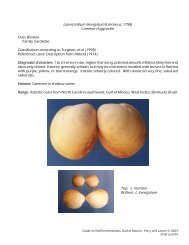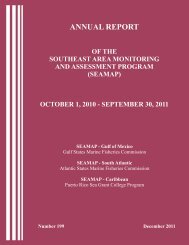Basic Commercial Fishing Regulations - Gulf States Marine ...
Basic Commercial Fishing Regulations - Gulf States Marine ...
Basic Commercial Fishing Regulations - Gulf States Marine ...
You also want an ePaper? Increase the reach of your titles
YUMPU automatically turns print PDFs into web optimized ePapers that Google loves.
<strong>Basic</strong> <strong>Commercial</strong> <strong>Fishing</strong> <strong>Regulations</strong><br />
lionfish<br />
Removing lionfish can help Florida’s native<br />
marine fish habitats and provide a meal at<br />
the same time…<br />
Florida has many fascinating saltwater fish species available in a multitude of<br />
shapes, sizes and colors. One fish that anglers and divers may encounter is the<br />
lionfish. These fish are intriguing in their own right but are not native to Florida<br />
and originate from the Indo-Pacific region. These fish are predatory reef fish that<br />
use their large spines, which possess venom, to protect themselves while they lay<br />
in wait to engulf small reef fish.<br />
Since lionfish were first reported off Florida’s Atlantic Coast in 1985, their life<br />
history has enabled them to build populations in Florida and other places along the Atlantic Ocean, <strong>Gulf</strong> of Mexico and the Caribbean. Their lack of<br />
major predators in these waters has allowed them to increase in numbers, expand their range, and negatively alter the natural systems where they<br />
are found. Recently, a lionfish derby in the Florida Keys harvested 531 lionfish.<br />
<strong>Commercial</strong> divers and anglers can remove lionfish they encounter to help control the numbers of these invasive fish. In Florida, lionfish have been<br />
documented in every coastal habitat from the shore around docks to ledges at 1,000 feet so look for these fish and be ready act as you are able. If you<br />
are comfortable in doing so, lionfish can be speared, caught with a hand net, as bycatch in traps or you may even catch one while fishing with a rod<br />
and reel. Remember, they have venomous spines so care should be taken when handling these fish; stings are rarely fatal.<br />
A saltwater products license is required to harvest and sell lionfish. Be sure to check gear, and other general regulations for their harvest at MyFWC.<br />
com Removing lionfish can help Florida’s native marine fish habitats and provide a meal at the same time. For more information about lionfish use<br />
these links:<br />
uSGS: http://nas.er.usgs.gov/queries/factsheet.html<br />
NOAA: http://oceanservice.noaa.gov/education/stories/lionfish/factsheet.html<br />
Stone Crab<br />
FWC proposes extension of stone crab<br />
protection into federal waters.<br />
The Florida Fish and Wildlife Conservation Commission (FWC)<br />
proposes an extension of stone crab protection into federal<br />
waters at the June commission meeting, the proposed rules<br />
would extend its state management regulations for stone<br />
crab into federal waters off Florida.<br />
Currently, the <strong>Gulf</strong> of Mexico Fishery Management Council<br />
has a federal fishery management plan in place for stone<br />
crabs. The Council recently voted to recommend the repeal<br />
of this plan to NOAA Fisheries Service (which has jurisdiction<br />
to manage stone crabs in federal waters) because the stone<br />
crab fishery is centered in Florida and the FWC already<br />
plays a leading role in stone crab stock assessments and<br />
management.<br />
Most of the stone crab fishery occurs in state waters off<br />
Florida, and existing federal regulations for stone crab are the<br />
same as the FWC’s rules. NOAA Fisheries Service intends<br />
to repeal the federal stone crab fishery management plan<br />
before this fall’s opening of stone crab season on Oct. 15.<br />
The proposed rules also will eliminate a federal form that<br />
would no longer be required after repeal of the federal stone<br />
crab plan.<br />
4<br />
28



